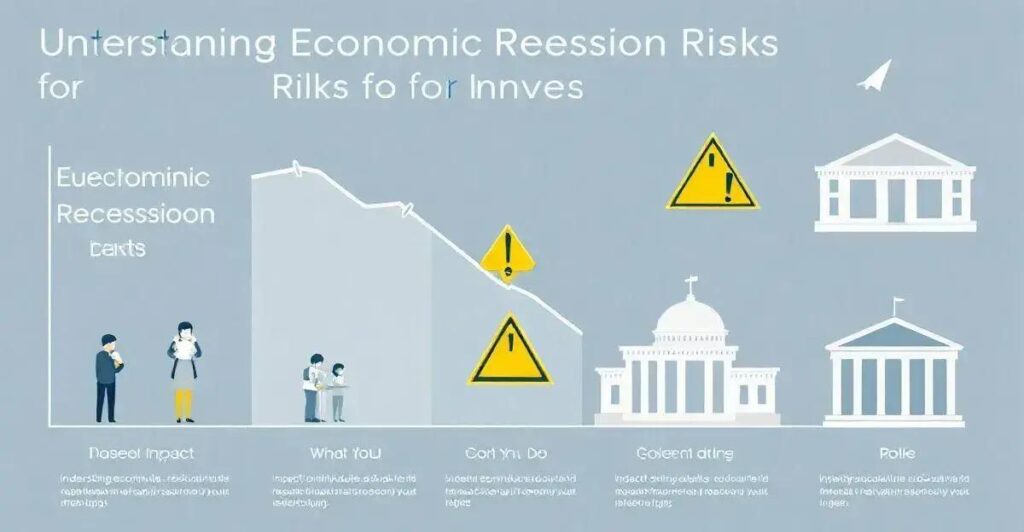Economic recession risks have been on the rise in recent years, leaving many wondering if we’re heading for another financial downturn.
The Economic recession risks are real, and it’s essential to understand the warning signs and take proactive steps to mitigate the impact.
In this article, we’ll delve into the causes, effects, and risks associated with economic recession, as well as provide guidance on how to prepare for the worst-case scenario.
Understanding Economic Recession Risks
Economic recession risks are a complex and multifaceted phenomenon that can be triggered by various factors, including global economic imbalances, rapid changes in technology, and unexpected shocks to the financial system. Understanding these risks is crucial for individuals, businesses, and policymakers to make informed decisions and mitigate their impact. A combination of factors, such as high levels of debt, inflation, and decreased consumer spending, can create a perfect storm that leads to an economic recession. As such, it is essential to stay informed and proactive in addressing these risks.
The causes of economic recession are varied and often interrelated. One of the primary causes is an over-reliance on debt, which can lead to a decrease in consumer spending and investment. This, in turn, can cause a decline in economic activity and a rise in unemployment. Other factors that can contribute to an economic recession include a decline in the housing market, a surge in commodity prices, and a decrease in global trade. Understanding the underlying causes of economic recession is critical for developing effective strategies to prevent and mitigate its impact.
The impact of economic recession on individuals can be severe and far-reaching. Reduced economic activity can lead to job losses, income reductions, and a decrease in disposable income. This can result in reduced consumer spending, which can further exacerbate the economic downturn. Furthermore, economic recession can also have a disproportionate impact on vulnerable populations, such as low-income households, the elderly, and small businesses. As such, it is essential to develop policies and strategies that protect these individuals and mitigate the effects of economic recession.
Economic recession risks are not inevitable, and there are steps that individuals and businesses can take to mitigate their impact. One of the most effective ways to prepare for an economic recession is to build an emergency fund, which can provide a financial safety net in the event of unexpected expenses or job loss. Another strategy is to diversify investments and reduce debt levels. Additionally, individuals and businesses can also take advantage of training and development opportunities to enhance their skills and adapt to changing market conditions.
The role of government in preventing economic recession is critical. Governments can use fiscal policy to stimulate economic activity, reduce unemployment, and increase consumer spending. They can also implement policies that promote economic growth, such as investing in infrastructure, education, and research and development. Furthermore, governments can also take steps to regulate financial markets, prevent excessive speculation, and maintain financial stability. By working together, governments, businesses, and individuals can mitigate the risks of economic recession and promote sustainable economic growth.
In conclusion, economic recession risks are a serious concern that requires a comprehensive approach to mitigate their impact. By understanding the causes, consequences, and risks associated with economic recession, individuals, businesses, and policymakers can take proactive steps to prevent and mitigate its effects. It is essential to develop policies and strategies that promote economic growth, stability, and resilience, and to prioritize the well-being of vulnerable populations. By working together, we can build a more robust and sustainable economic future.
The Causes of Economic Recession

The causes of economic recession are complex and multifaceted. One of the primary factors is an over-reliance on debt, which can lead to a decrease in consumer spending and investment. This, in turn, can cause a decline in economic activity and a rise in unemployment. Other factors that can contribute to an economic recession include a decline in the housing market, a surge in commodity prices, and a decrease in global trade. Understanding the underlying causes of economic recession is critical for developing effective strategies to prevent and mitigate its impact.
The impact of economic recession on individuals can be severe and far-reaching. Reduced economic activity can lead to job losses, income reductions, and a decrease in disposable income. This can result in reduced consumer spending, which can further exacerbate the economic downturn. Furthermore, economic recession can also have a disproportionate impact on vulnerable populations, such as low-income households, the elderly, and small businesses.
Economic recession risks are not inevitable, and there are steps that individuals and businesses can take to mitigate their impact. One of the most effective ways to prepare for an economic recession is to build an emergency fund, which can provide a financial safety net in the event of unexpected expenses or job loss. Another strategy is to diversify investments and reduce debt levels. Additionally, individuals and businesses can also take advantage of training and development opportunities to enhance their skills and adapt to changing market conditions.
The role of government in preventing economic recession is critical. Governments can use fiscal policy to stimulate economic activity, reduce unemployment, and increase consumer spending. They can also implement policies that promote economic growth, such as investing in infrastructure, education, and research and development. Furthermore, governments can also take steps to regulate financial markets, prevent excessive speculation, and maintain financial stability.
In taking control of economic recession risks, it is essential to have a comprehensive understanding of the causes, consequences, and risks associated with economic recession. By staying informed and proactive, individuals, businesses, and policymakers can take effective steps to prevent and mitigate the impact of economic recession. This includes developing policies and strategies that promote economic growth, stability, and resilience, and prioritizing the well-being of vulnerable populations.
The Impact of Economic Recession on Individuals
The impact of economic recession on individuals can be severe and far-reaching. Job losses, income reductions, and decreased disposable income are just a few of the consequences individuals may face during an economic recession.
For those who are already struggling financially, an economic recession can be a devastating blow, leading to increased stress, anxiety, and uncertainty about their financial future.
Furthermore, economic recession can also have a disproportionate impact on vulnerable populations, such as low-income households, the elderly, and small businesses.
It is essential to understand the impact of economic recession on individuals and develop strategies to mitigate its effects.
Economic Recession Risks: What You Can Do

While economic recession risks are a serious concern, there are steps that individuals and businesses can take to mitigate their impact. One of the most effective ways to prepare for an economic recession is to build an emergency fund, which can provide a financial safety net in the event of unexpected expenses or job loss.
Additionally, individuals and businesses can also take advantage of training and development opportunities to enhance their skills and adapt to changing market conditions.
Furthermore, diversifying investments and reducing debt levels can also help to reduce the risk of financial instability. By taking proactive steps, individuals and businesses can reduce their exposure to economic recession risks and better navigate the challenges that come with them.
The Role of Government in Preventing Economic Recession
The role of government in preventing economic recession is critical. Governments can use fiscal policy to stimulate economic activity, reduce unemployment, and increase consumer spending.
They can also implement policies that promote economic growth, such as investing in infrastructure, education, and research and development.
Furthermore, governments can also take steps to regulate financial markets, prevent excessive speculation, and maintain financial stability.
By working together with the private sector and taking proactive measures, governments can help to mitigate the risks of economic recession and promote sustainable economic growth.
Conclusion: Taking Control of Economic Recession Risks

In conclusion, economic recession risks are a serious concern that requires a comprehensive approach to mitigate their impact.
By understanding the causes, consequences, and risks associated with economic recession, individuals, businesses, and policymakers can take proactive steps to prevent and mitigate its effects.
The role of government in preventing economic recession is critical, and fiscal policy, regulatory measures, and investment in key sectors can play a crucial role in stimulating economic activity and promoting sustainable growth.
By working together, we can build a more resilient and sustainable economic future.
FAQ – Frequently Asked Questions About Economic Recession Risks
What are the causes of economic recession?
Economic recession can be caused by a combination of factors, including high levels of debt, inflation, decreased consumer spending, and global economic imbalances.
How does economic recession impact individuals?
Economic recession can have a severe impact on individuals, including job losses, income reductions, and decreased disposable income.
What can individuals do to prepare for economic recession?
Individuals can prepare for economic recession by building an emergency fund, diversifying investments, and reducing debt levels.
What is the role of government in preventing economic recession?
The government can play a critical role in preventing economic recession by using fiscal policy, regulating financial markets, and investing in key sectors.
How can businesses mitigate the impact of economic recession?
Businesses can mitigate the impact of economic recession by diversifying their products or services, reducing costs, and investing in research and development.
What are the consequences of ignoring economic recession risks?
Ignoring economic recession risks can lead to severe consequences, including job losses, business closures, and decreased economic growth.



